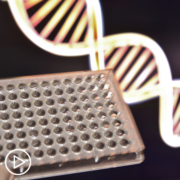Prostate Cancer Treatment Decisions: How Do Genetic Test Results Impact Your Options?
Prostate Cancer Treatment Decisions: How Do Genetic Test Results Impact Your Options? from Patient Empowerment Network on Vimeo.
How do genetic test results impact prostate cancer treatment options? Dr. Nima Sharifi explains BRCA mutations, germline genes, and somatic mutations—and discusses when treatment with PARP inhibitors may be appropriate.
Dr. Nima Sharifi is Director of the Genitourinary (GU) Malignancies Research Center at the Cleveland Clinic. Learn more here.
See More From INSIST! Prostate Cancer
Related Resources

|

Targeted Prostate Cancer Therapies vs. Chemotherapy: What’s the Difference? |

|
Transcript:
Dr. Sharifi:
There are several types of mutations that occur in prostate cancer. We know about a lot of them. We’re beginning to understand the function of many of them, and the role of just a few of them has become a bit clearer in treatment of prostate cancer. So, the one that I think has the clearest implications is something called BRCA mutations.
So, you can get mutations in genes that regulate DNA damage. This can occur in either inherited genes, or these are mutations that can occur in the cancer itself. And this will allow for tumors to become the developed – actually, greater DNA damage. The implications of using this information, genetic testing for these BRCA mutations, are actually several. One is that it may – if it comes in through the germline, then it tells us something about the hereditary or familial component of it.
So, that has implications not only for the patient but also potentially family members. And then the second set of implications has to do with treatment, and specifically treatment that in more advanced cases where there are now two FDA-approved agents that are used specifically for patients who have mutations in these genes.
And we’re still learning a lot about what these genes mean, or mutations of these genes mean for patients in their clinical course. And we’re learning much more information about other mutations which may occur in prostate cancer as well.
So, we should draw a distinction between two different types of genes. One is germline. Germline has to do with the DNA or the genes that you inherit from your parents. And the second category is somatic mutations, or somatic genetics. And this, specifically, has to do with mutations that occur in the cancer cell itself, but that are not inherited from one’s parents.
It’s a very active area of research. So, again, for the vast majority of mutations that we recognize in prostate cancer, we don’t use that to make clinical decisions. There are a few, such as the DNA damage repair genes or BRCA genes – which tell us something about the potential for a more aggressive disease course or a more aggressive disease – and also the potential appropriateness of using agents called PARP inhibitors, which seem to specifically work in patients who have mutations in the BRCA family of genes.
So, in terms of the treatment options, the major genetic tests that allow us to figure out whether systemic or drug treatment option is appropriate or not, is in DNA damage repair genes such as BRCA.
So, for example, in the case of metastatic disease that’s resistant to hormonal therapy and has already been treated with other therapies, if there is a mutation in BRCA or one of the closely related gene members, then use of a drug called a PARP inhibitor may be appropriate, and that could benefit patients.



